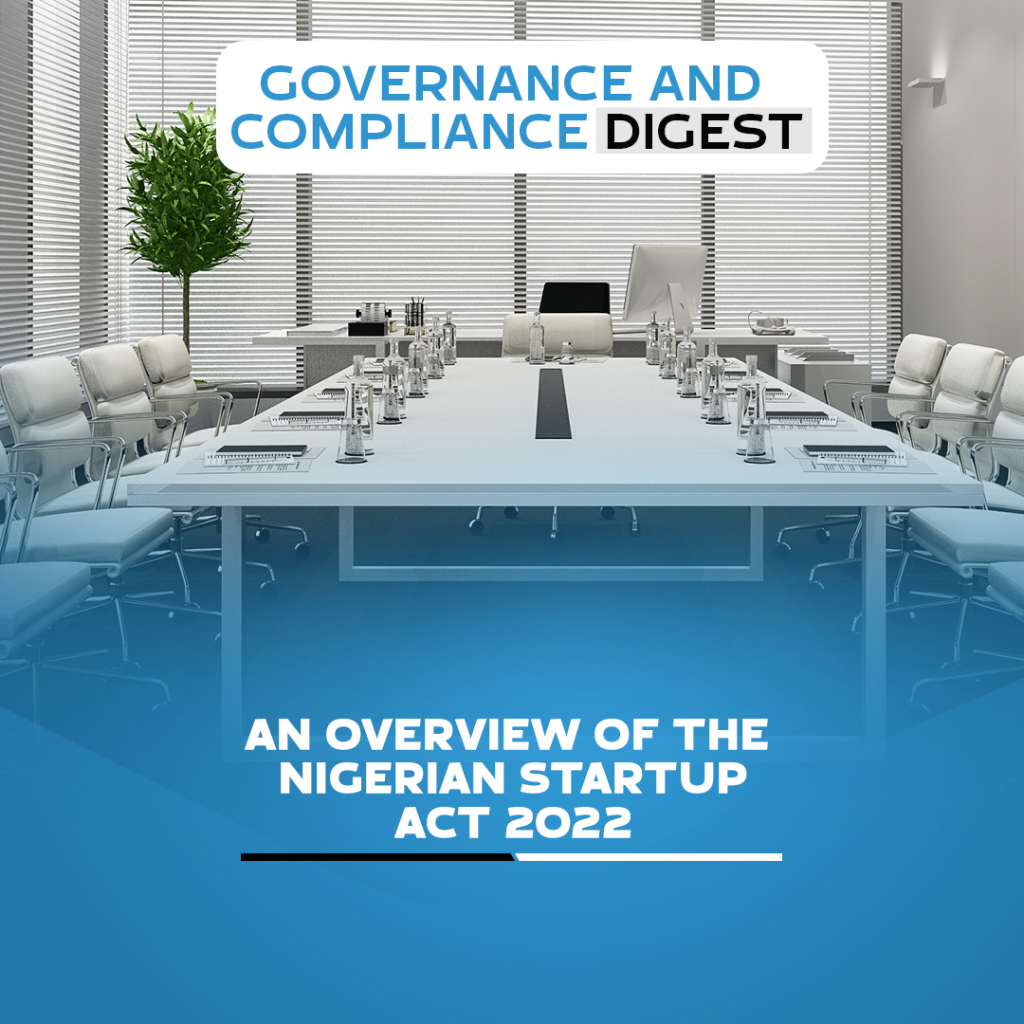An Overview of the Nigerian Startup Act 2022
ABOUT THE ACT
On the 19th of October 2022, Nigeria witnessed the signing into Law of the Nigerian Startup Act (the Act) by President Muhammadu Buhari. The core objective of the Act is the provision of a legal and institutional framework for the development of startups in Nigeria, thereby paving the path to harnessing the Nigerian digital economy through co-created regulations. The Act also seeks to guarantee the conduciveness of Laws and Regulations towards the development and growth of the country’s tech ecosystem which ultimately makes the Nigerian tech industry a formidable competitor in the global market.
SCOPE OF THE ACT
The Act addresses grey areas faced by startups in the country, such as; a vague regulatory framework, unfriendly environment and inadequacy of local content support.
In summary the Act provides for the council for digital innovation and entrepreneurship as well as its secretariat, the startup support and engagement portal, startup labelling, startup investment seed fund, training and capacity building & development, tax & fiscal incentives, regulatory support, accelerators & incubators, clusters, hubs, innovation parks, and technology development zones.
Some highlights in the Act worthy of note include:
1. Startup Labelling; the Act has clearly spelled out prerequisites for businesses to be identified as a “startup”. Upon fulfillment of these requirements will a business be labelled as such. Some of the requirements are:
- Foremost is the registration of the business as a limited liability company which must not have been in existence for up to 10 years from its incorporation to date;
- Having objects of innovation, development, production, improvement and commercialization of digital technology, innovative product or process;
- Ownership or authoring of an innovative digital product, process or software;
- And indigenous participation/ownership of the startup with at least one Nigerian founder or co-founder.
- Establishment of the Council for Digital Innovation and Entrepreneurship as well as its Secretariat. The Council is to be Chaired by the President and its functions include formulation of policies for realizing the objectives of the Act, monitoring and evaluation of the regulatory framework to encourage development of startups in Nigeria, support of digital technological development through grants.
- Availability of Incentives for the enjoyment of startups which may be fiscal or tax based, some of these include:
- Financing of Startups Based on the provisions of Section 19 of the Act, a Startup Investment Seed Fund (“the Fund”) will be established by the Council.
- Protection of Intellectual Property Rights via ease of local and international registration of intellectual property for startups through the portal as well as legal support in case of breaches.
- Labelled Startups operating in eligible industries under the Pioneer Status Incentives (PSI) Scheme may apply through the Secretariat to the Nigerian Investment Promotion Commission (NIPC) for grant of tax reliefs and incentives under the PSI. This gives labelled startups tax holidays for some period.
- Exemption from contribution to the Industrial Training Fund (ITF) Section 25(5) of the Act exempts Labelled Startups from contributions to ITF in respect of in-house training provided to their employees for the duration of the startup label.
4. Creation of cluster hubs and innovation parks which would promote connection and fostering a communal disposition that impacts the development of ideas and subsequent growth of the industry.
CONCLUSION
On the face of it, the establishment of the Act is a step in the right direction for the development and growth of the Nigerian digital and technological industry. However, upon deeper probe the excessive inclusiveness and participation of the executive arm of Government in the management of the council as well as decision making with regard to the Act may become counter productive on the long run.
Also the creation of Startup Investment Seed Fund is laudable but may be used as a tool for exploitation and imposition of additional levies unless the sources of financing it are clearly defined, this may be through regulation. States are encouraged to adopt the Act by narrowing its provisions into Laws in order to facilitate better execution and attainment of its provisions.
Reference
The Nigerian Startup Act 2022.
For further discussion and assistance with filing any of your organization’s compliance returns to the Corporate Affairs Commission, as well as providing you with Board Evaluation and Nominee services, please contact us at contact@firstfiduciary.ng or any of the team member below:
Frances Nwakobi-Onuigbo
frances.nwakobi@firstfiduciary.ng
+234 803 738 4994
Femi Goyea
femi.goyea@firstfiduciary.ng
+234 706 765 5214

N’Assembly Passes 2023 Budget, Raises Proposed Spending by N1.32trn to N21.82trn
The Senate and House of Representatives, yesterday, passed the 2023 appropriation bill after raising the N20.51 trillion proposed spending presented by President Muhammadu Buhari by N1.32 trillion, to N21.82 trillion.
READ MORE
Lagos Judiciary begins digital oath-taking, e-filing processes
The Chief Judge of Lagos State, Justice Kazeem Alogba has directed the commencement of digital swearing of e-filing processes for speedy dispensation of justice.
READ MORE
Idigbe pledges to impact on Delta economy
As an association president, the senior partner at Punuka Attorneys and Solicitors, Chief Anthony Idigbe (SAN), has pledged to make a meaningful impact on both the public and private sectors in Delta State.
READ MORE
New currency: Senate urges CBN to extend withdrawal date to June 31
The Senate has urged the Central Bank of Nigeria (CBN) to urgently extend the withdrawal date of old currency notes from Jan. 31, 2023 to June 31.
READ MORE
